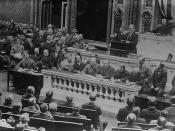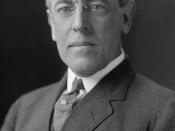5th AP History
January 13, 2003
Divided We Govern
David R. Mayhew
The question of whether divided party control of the American national government is an advantage or disadvantage has long been debated. Many Americans agree with Woodrow Wilson's philosophy, "You cannot compound a successful government out of antagonisms." In other words, a legislative and executive branch controlled by the same political party have a stronger tie and connection and encounters fewer stumbling blocks as they move forward with national policies and issues. There is a sense that divided party control contributes to counter productive law making.
How does Congress behave when the president is a member of the opposite party? Many would agree that their role becomes more of a "watch dog," scrutinizing every decision and action coming from the Oval Office.
Mayhew poses five questions that probe the issue of divided party control of government. First, he questions whether what government legislates might be more "defective" coming from divided party control, even if as many laws are enacted as with unified party control.
Is such legislation as clean and effective as it could be?
A second question involves the coherence of statues. Are statues as coherent coming from divided party control? Mayhew points out, however, that coherence is often in the eye of the beholder. Historically, democracy has continued even with various decentralized policies. Ultimately, some ideological coherence as well as budgetary coherence is necessary.
Mayhew's third question addresses whether the "tug of war" between a president and congress from divided parties actually undermines law implementation, agency functioning, and program administration. The fact that there has been more micro-management in government is not necessarily a result of divided party control, but rather a public distrust of government like that of Watergate.
Whether divided party control interferes with foreign...



Very well done
I used this to clarify an ap gov reading...thank you very much for writing this..it was very well done!
0 out of 0 people found this comment useful.